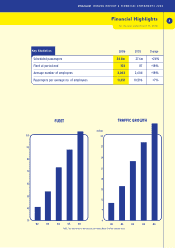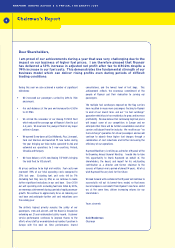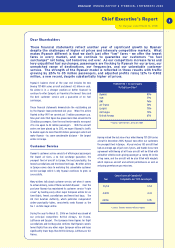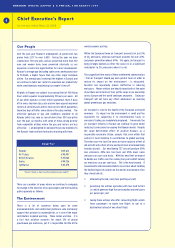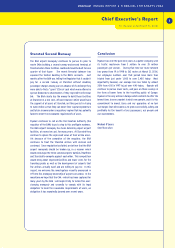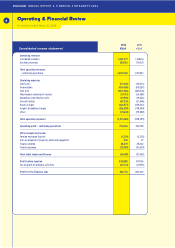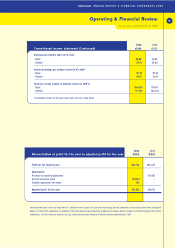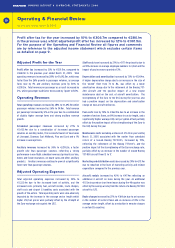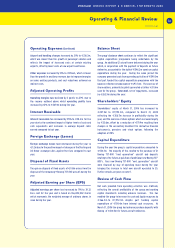Ryanair 2006 Annual Report Download - page 13
Download and view the complete annual report
Please find page 13 of the 2006 Ryanair annual report below. You can navigate through the pages in the report by either clicking on the pages listed below, or by using the keyword search tool below to find specific information within the annual report.
Legal Proceedings (Continued)
Following the Commission’s decision in Charleroi other airlines
have brought similar complaints against Ryanair in an attempt
to block competition. However, Ryanair is confident that its
agreements with publicly owned airports comply with the
market economy investor principle (MEIP), i.e., they are the
same as its agreements with privately owned airports, and
therefore do not constitute state aid.
Ryanair has also filed complaints with the European
Commission against Alitalia, Air France and Lufthansa on the
basis of continued state aid to these national airlines. We also
believe that Air France and Alitalia are the beneficiaries of
substantial subsidies via routes that are subject to the so-
called public service obligations (PSO’s). Ryanair was recently
prevented from offering commercial services on the Rome to
Alghero (Sardinia) route as a result of what Ryanair believes
are the Italian government’s abusive application of the PSO
system to favour Italian airlines. Ryanair has appealed this
decision to the European Commission.
As a result of the retirement of the Boeing 737-200 aircraft,
Ryanair required its pilots who lacked the necessary training
to undergo a conversion training process to enable them to fly
the new Boeing 737-800 aircraft. Starting in the Autumn of
2004, Ryanair made a number of written offers to its Dublin
based pilots to enable them to participate in a re-training
process in order to obtain the correct type rating for flying the
Boeing 737-800 aircraft. After rejecting a series of offers, all
of these pilots have now been trained on the Boeing 737-800
either by signing a five year bond, in which case the training
was provided free of charge, or they could pay in advance the
15k cost of the conversion training. However, these pilots
are at the same time challenging the terms before the Labour
Relations Commission on grounds of victimization. They have
also initiated High Court proceedings claiming that the terms
of the bond infringed their human rights in relation to freedom
of association and the ability of Trade Union to negotiate on
their behalf.
While the Company believes these court proceedings are
meritless and is contesting the 77 pilots' claims, however
should the Labour Relations Commission rule in their favor, the
Company could face potential sanctions in an amount up to a
maximum of twice the annual salary of the affected pilots. In
relation to the High Court proceedings it is more difficult to
gauge the potential for damages, however in a worst case
scenario a figure of 100k per pilot would not seem
unreasonable.
Recruitment and Promotion
During the year 343 of our people were promoted internally
within the group, and Ryanair employed more than 700 staff at
the year end compared to the preceding year.
Safety
Safety in the airline remains an absolute priority. This is
Ryanair’s 21st year of safe operations. Ryanair has extensive
safety training programmes to ensure the recruitment of
suitably qualified pilots, cabin crew, ground crews and
maintenance personnel. In addition, the group operates and
maintains all of its aircraft in accordance with the highest
European Aviation Industry Standards. Ryanair is regulated by
the Irish Aviation Authority.
At each Board Meeting a report prepared by the Ryanair Safety
Committee is circulated in advance and is reviewed by the
Board. The Safety Committee, comprises Michael Horgan
(Chairperson), a director of the Board, the Director of Flight
and Ground Operations, the Chief Pilot, the Flight Safety
Officer, Director of Engineering, Director of Personnel and In-
flight, Quality Assurance Manager-Maintenance, Deputy
Director of Ground Operations, Deputy Director of Safety and
the Health and Safety Officer. The Safety Committee meets on
a quarterly basis and reports directly to the Board of
Directors. The Flight Safety Officer is responsible for
monitoring flight safety. The group also has a Health and
Safety Officer who is responsible for overseeing health and
safety in all areas. The group continues to operate extensive
training and safety programmes to ensure the health and
safety of all its passengers and employees.
Critical Accounting Policies
The group believes that its critical accounting policies, which
are those that require management's most difficult, subjective
and complex judgments, are those described in this section.
These critical accounting policies, the judgments and other
uncertainties affecting application of those policies and the
sensitivity of reported results to changes in conditions and
assumptions are factors to be considered in reviewing the
consolidated financial statements
(Continued)
Operating & Financial Review 13
ANNUAL REPORT & FINANCIAL STATEMENTS 2006


